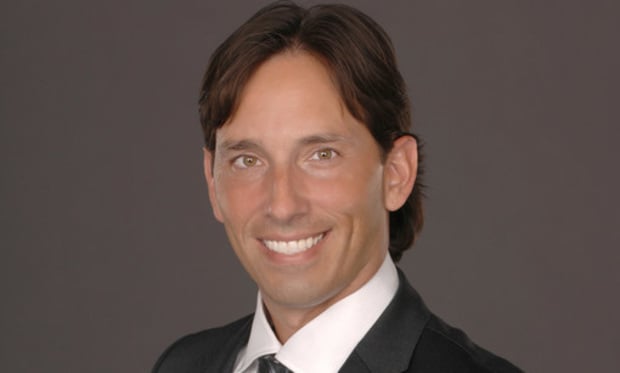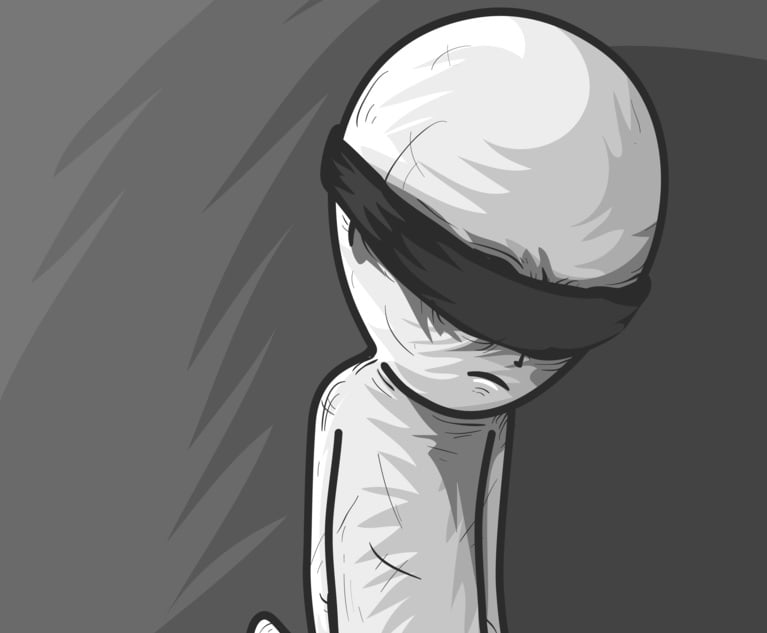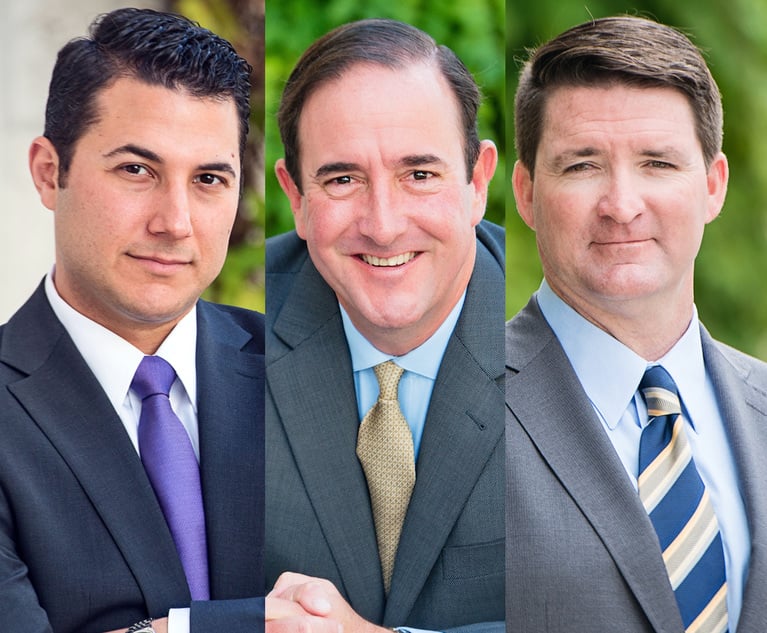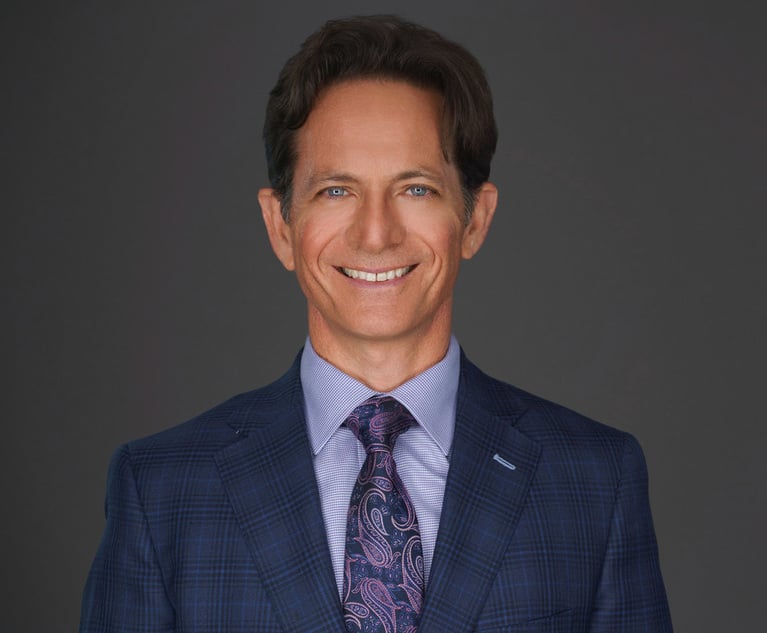Pictures Worth $2 Million: South Florida Lawyers Leverage CT Scan to Negotiate Settlement
Kelley Uustal partner Todd Falzone and his team argued that a radiologist took no more than half a second looking at 691 different images of a CT scan of a patient who later died of bleeding in the brain.
January 17, 2020 at 02:45 PM
6 minute read
 Todd Falzone of Kelley Uustal in Fort Lauderdale. Courtesy photo.
Todd Falzone of Kelley Uustal in Fort Lauderdale. Courtesy photo.
Kelley Uustal partner Todd Falzone and associate Karina Rodrigues in Fort Lauderdale teamed with Michael Elstein of the Elstein Law Firm in Wellington to negotiate a $2 million settlement for a widow who claimed her husband died because a radiologist didn't properly look at his CT scan.
The case settled days before trial, after the plaintiffs team found rare "smoking gun" data to bolster their claims.
Retired 64-year old Leonard Burstein banged his head on a filing cabinet after losing his balance while tying his shoes in January 2015.
His head was bleeding. For Burstein, who was on blood-thinning medication Coumadin for a heart condition, there was real risk of a brain hemorrhage because of excess bleeding.
Paramedics took Burstein to West Boca Medical Center Inc., where the doctor ordered a CT scan. The scan generated hundreds of 3D images of his brain, shown in tiny increments from top to bottom and back to front.
"You know when you have a ham for a holiday and you cut it up in slices?" Falzone said. "That's what a CT scan does. It takes pictures in those slices."
Doctors electronically transmitted 691 images to radiologist Steven Fuhr, who was at a different hospital owned by the same company, defendant Tenet Healthcare Corp.
The images included brain and neck CT scans, and a scan from years earlier when Burstein reported migraines. And according to Falzone, they came with written instructions that Burstein was on Coumadin — meaning the radiologist had to watch out for signs of a brain hemorrhage.
But instead, Burstein's wife claimed Fuhr rushed his report, which said Burstein had no bleeding inside his brain. Relying on that, the emergency room doctors discharged him about an hour and 15 minutes after he'd arrived.
"Nowadays, in these emergency rooms, it's all about speed: how fast they get you in, how fast they get you out," Falzone said. "In fact, they have billboards advertising how fast they are."
When Burstein got home, his health deteriorated, according to his wife of 38 years, who called for help again when he became shaky and weak, and slumped on the ground.
"The same rescue truck shows up and they say, 'What the hell are you doing here?' " Falzone said. " They look at him and they see he doesn't look right, and his blood pressure is all wrong."
This time, Burstein went to the Delray Medical Center, which again relied on the radiologist's report, and discounted the possibility of a brain hemorrhage. About an hour later, Burstein began to vomit and eventually lost consciousness. After another CT scan, a different radiologist discovered Burstein had massive internal bleeding in his brain, but it was too late to save him.
Burstein died the next day, according to the resulting lawsuit, which accused West Boca Medical Center, Tenet Healthcare, Fuhr and his employer Sheridan Radiology Services of South Florida Inc. of negligence and vicarious liability.
Falzone said he and Elstein were shocked when they saw the original CT scan.
"I'm not a radiologist, but I can clearly see on dozens of the images of the CT that there's bleeding inside his brain. It's not subtle,' " Falzone said. " And what's really upsetting is that on the scan, the area inside his brain where it's bleeding is directly below the area where there's a big bump on his head."
Plaintiffs experts claimed that if the radiologist had noticed the brain bleed, doctors could have reversed it in minutes, while Fuhr denied any wrongdoing and insisted he viewed each image twice.
Defense attorneys Robert Paradela of Wicker Smith, Kenneth Morgan Jr. of Billing Cochran Lyles in Fort Lauderdale and Brian Murry of Paul Knopf Bigger in Winter Park did not respond to requests for comment by deadline. Their clients denied any wrongdoing, alleged Burstein's own negligence contributed to his death and claimed the lawsuit was barred under the statute of limitations.
'Insanity'
The plaintiff's case transformed once they subpoenaed the head of radiology and had him print out a record of every keystroke Fuhr made on his computer that day, including from the moment he opened Burstein's images.
"That entire process for 691 images took a total of six minutes and 26 seconds," Falzone said. "If we were to assume that he did nothing but open them up and immediately start reading them, he spent half a second looking at each image. That's two images per second, and that is insanity."
Falzone said he's handled several cases involving the same companies and issues, which he suspects are happening because radiologists are pressured to read scans as quickly as possible.
"There's pressure being applied to them to go faster, and the problem with that is these reads are relied on by doctors who don't read the films themselves," Falzone said. "The way to protect yourself is to question the doctors at length about the films and see if they will look at the films themselves."
Falzone said his client accepted a $500,000 offer from the radiology company and a $1.5 million offer from the hospital to avoid reliving what happened. And without her husband's retirement money, she'd had to work two jobs.
"She's never going to get over it," Falzone said. "He was the love of her life and, to this day, if you bring him up and talk about him, she cries."
Cases like this are getting scarce, according to Falzone, who said new laws limiting medical malpractice claims have resulted in less claims in Florida than ever before. That, he argues, means hospitals and doctors feel they "have no one watching them."
"They're not doing it on purpose, but it makes them psychologically less careful if they don't think that there's a real threat from a lawyer," Falzone said. "We're sort of a public safety arm, because if people are afraid they're going to get sued, they're more careful."
Case No.: 50-2017-CA-003943
Case: Georgie Burstein v. West Boca Medical Center
Description: Wrongful death
Filing date: April 7, 2017
Settlement date: Nov. 14, 2019
Judge: Palm Beach Circuit Judge Glenn Kelley
Plaintiffs attorneys: Todd Falzone and Karina Rodrigues, Kelley Uustal, Fort Lauderdale; Michael Elstein, Elstein Law Firm, Wellington
Defense attorneys: Robert Paradela of Wicker Smith, Fort Lauderdale; Kenneth Morgan Jr., Billing Cochran Lyles, Fort Lauderdale; Bryan Murry, Paul Knopf Bigger, Winter Park
Settlement amount: $2 million
More verdicts and settlements:
Miami Lawyer Negotiates $1.25 Million Settlement Over Hit-and-Run Death
'I Thought I Was Going To Get Killed': South Florida Lawyers Win $4M Against Disney Cruise Line
This content has been archived. It is available through our partners, LexisNexis® and Bloomberg Law.
To view this content, please continue to their sites.
Not a Lexis Subscriber?
Subscribe Now
Not a Bloomberg Law Subscriber?
Subscribe Now
NOT FOR REPRINT
© 2025 ALM Global, LLC, All Rights Reserved. Request academic re-use from www.copyright.com. All other uses, submit a request to [email protected]. For more information visit Asset & Logo Licensing.
You Might Like
View All
Automaker Pleads Guilty and Agrees to $1.6 Billion in Payouts

'I've Seen Terrible Things': Lawyer Predicts Spike in Hazing Suits

Florida Retention Ponds Scrutinized in Lawsuit After Latest Child Drowning
Trending Stories
- 1New York-Based Skadden Team Joins White & Case Group in Mexico City for Citigroup Demerger
- 2No Two Wildfires Alike: Lawyers Take Different Legal Strategies in California
- 3Poop-Themed Dog Toy OK as Parody, but Still Tarnished Jack Daniel’s Brand, Court Says
- 4Meet the New President of NY's Association of Trial Court Jurists
- 5Lawyers' Phones Are Ringing: What Should Employers Do If ICE Raids Their Business?
Who Got The Work
J. Brugh Lower of Gibbons has entered an appearance for industrial equipment supplier Devco Corporation in a pending trademark infringement lawsuit. The suit, accusing the defendant of selling knock-off Graco products, was filed Dec. 18 in New Jersey District Court by Rivkin Radler on behalf of Graco Inc. and Graco Minnesota. The case, assigned to U.S. District Judge Zahid N. Quraishi, is 3:24-cv-11294, Graco Inc. et al v. Devco Corporation.
Who Got The Work
Rebecca Maller-Stein and Kent A. Yalowitz of Arnold & Porter Kaye Scholer have entered their appearances for Hanaco Venture Capital and its executives, Lior Prosor and David Frankel, in a pending securities lawsuit. The action, filed on Dec. 24 in New York Southern District Court by Zell, Aron & Co. on behalf of Goldeneye Advisors, accuses the defendants of negligently and fraudulently managing the plaintiff's $1 million investment. The case, assigned to U.S. District Judge Vernon S. Broderick, is 1:24-cv-09918, Goldeneye Advisors, LLC v. Hanaco Venture Capital, Ltd. et al.
Who Got The Work
Attorneys from A&O Shearman has stepped in as defense counsel for Toronto-Dominion Bank and other defendants in a pending securities class action. The suit, filed Dec. 11 in New York Southern District Court by Bleichmar Fonti & Auld, accuses the defendants of concealing the bank's 'pervasive' deficiencies in regards to its compliance with the Bank Secrecy Act and the quality of its anti-money laundering controls. The case, assigned to U.S. District Judge Arun Subramanian, is 1:24-cv-09445, Gonzalez v. The Toronto-Dominion Bank et al.
Who Got The Work
Crown Castle International, a Pennsylvania company providing shared communications infrastructure, has turned to Luke D. Wolf of Gordon Rees Scully Mansukhani to fend off a pending breach-of-contract lawsuit. The court action, filed Nov. 25 in Michigan Eastern District Court by Hooper Hathaway PC on behalf of The Town Residences LLC, accuses Crown Castle of failing to transfer approximately $30,000 in utility payments from T-Mobile in breach of a roof-top lease and assignment agreement. The case, assigned to U.S. District Judge Susan K. Declercq, is 2:24-cv-13131, The Town Residences LLC v. T-Mobile US, Inc. et al.
Who Got The Work
Wilfred P. Coronato and Daniel M. Schwartz of McCarter & English have stepped in as defense counsel to Electrolux Home Products Inc. in a pending product liability lawsuit. The court action, filed Nov. 26 in New York Eastern District Court by Poulos Lopiccolo PC and Nagel Rice LLP on behalf of David Stern, alleges that the defendant's refrigerators’ drawers and shelving repeatedly break and fall apart within months after purchase. The case, assigned to U.S. District Judge Joan M. Azrack, is 2:24-cv-08204, Stern v. Electrolux Home Products, Inc.
Featured Firms
Law Offices of Gary Martin Hays & Associates, P.C.
(470) 294-1674
Law Offices of Mark E. Salomone
(857) 444-6468
Smith & Hassler
(713) 739-1250







